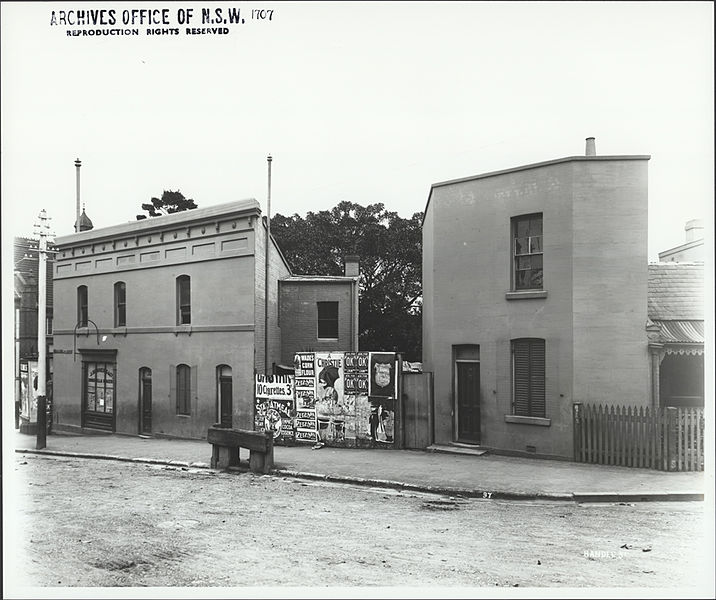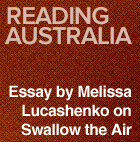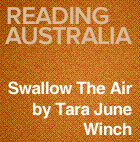AustLit
-
This trail brings together a range of useful resources and links to online material to enhance readers' encounters with this powerful first book by Wiradjuri writer, Tara June Winch.
– Part One examines the places in which the book is set or that have influenced Winch.
– Part Two examines history, identity and writing, and it includes links to resources about the Stolen Generations and the Indigenous leader Windradyne.
– Part Three details what happened next in Winch's career, and it is followed by suggestions for further reading. Some of these critical works and other resources are available to read online.
Click the hyperlinks in the citations below to be taken to the full text.
-
 Photo courtesy of UQP.See full AustLit entry
Photo courtesy of UQP.See full AustLit entryTara June Winch was born in Wollongong in 1983. She is of Wiradjuri and English heritage. At 17, Winch left home to travel across Australia.
She studied for a Bachelor of Arts, Indigenous Studies at Ginibi College, Southern Cross University, but left after the manuscript for her first book won the David Unaipon Award in 2004. It was subsequently published in 2006 by UQP. She was chosen for the 2008-2009 Rolex Mentor and Protege Arts Initiative in which she was partnered with Nigerian writer and Nobel Laureate Wole Soyinka.
Explore the AustLit author entry for Tara June Winch to discover other works and details of her life and writing.
-
See full AustLit entry
An introduction to Swallow the Air, this work was written for the Reading Australia project. Novelist Melissa Lucashenko writes: ‘when May Gibson's mother dies unexpectedly beneath the jacaranda tree in the backyard, and her small family disintegrates around her, May's search is not for her Aboriginality. It is, rather, for somewhere to belong as she used to belong in her mother's presence.
(...more)Available online at Reading Australia.
-
Since May is always on the move, place and travel are important themes in the book. The resources below examine some of the places that appear in the book, and some of the places that have influenced Winch.
-
Redfern and The Block
May lives for a time at 7 Caroline St, Redfern. The street is part of 'The Block', an important Sydney housing development for Indigenous Australians. The Block: Stories from a Meeting Place is an interactive documentary in which users navigate through the space of the Block and hear stories from people who have lived in or regularly visited the area. Young and old people tell stories about the area as it was from its inception in the 1970s onwards, and talk about what it means to them.
Historical photographs of the Block can be viewed via the National Library of Australia’s Trove service. For example, Patricia Baillie’s collection of photographs from 2004.
-
Redfern Now - ABC TV
The ABC television series Redfern Now is the first contemporary television drama to be written, produced and directed by Indigenous Australians. Information and a video about the making of the series can be found on the ABC’s Redfern Now page.
See the AustLit entry for Redfern Now.
Redfern Now. Prod. ABC Television; Screen Australia; BlackFella Films. Australia: ABC1. 2012.
-
See full AustLit entry
In this short essay, Winch reflects on Queensland’s reputation for racism, why she moved there, and what she found when she did.
(...more)Winch, Tara June. 'My Queensland: Finding a Voice.' Griffith Review 21 (2008): 148-149. Online at http://pandora.nla.gov.au/pan/121815/20100922-0051/www.griffithreview.com/edition-21/58-reportage/623.html. Sighted 06/12/2013.
-
See full AustLit entry
In this autobiographical piece, Winch writes about her young adult years, the coast, and growing up. Like parts of Swallow the Air, it has striking imagery of coastal landscapes.
(...more)Winch, Tara June. 'Summers Gone' The Age. Sec: Good Weekend. 22 Dec. 2007: 29-30. Print. Also online here. Accessed 06/12/2013.
-
May’s desire to get a sense of the past, her family, and her history is part of the motivation for her travel. As she moves from place to place, however, every place is somehow lacking, or missing something she needs. When May finally meets her cousin, one of the Stolen Generations, at Lake Cargelligo, he tells her 'there is a big missing hole between this place and the place you're looking for. That place, that people, that something you’re looking for. It’s gone. We weren’t told, love; we weren't allowed to be Aboriginal' (p. 181-82).
-
See full AustLit entry
Winch discusses grief, writing, and identity. Asked about the meaning behind the title of her book, she says: ‘It’s about grabbing hold of your history to understand yourself and your identity.’
(...more)Byrne, Madeleine. 'An Interview with Tara June Winch.' Antipodes 21. 2 (2007): 130-131.
-
The practice of removing Indigenous children from their families was first examined in detail in the Bringing Them Home Report (1997), which resulted from the National Inquiry into the Separation of Aboriginal and Torres Strait Islander Children from Their Families. The report includes testimony from people who were removed from their families, and covers every state and territory in Australia. The tenth anniversary of the report was recognised with an anthology of stories that can be read online.
Australian Government. National Inquiry into the Separation of Aboriginal and Torres Strait Islander Children from Their Families. Report of the National Inquiry into the Separation of Aboriginal and Torres Strait Islander Children from Their Families. Sydney: Human Rights and Equal Opportunities Commission, 1997. Online at http://www.humanrights.gov.au/publications/bringing-them-home-report-1997. Sighted 06/12/2013.
-
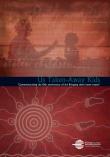 This image has been sourced from front coverSee full AustLit entry
This image has been sourced from front coverSee full AustLit entryIntroduction states: 'To commemorate the 10th anniversary of the publication of the Bringing Them Home report (1997), it is fitting that we should look to those whose stories of removal formed the basis of the report and its recommendations. With this in mind, the Human Rights and Equal Opportunity Commission invited Indigenous peoples across Australia to tell us their experiences of removal, their thoughts ten years on from the Inquiry and their hopes for the future.
(...more)Us Taken-Away Kids : Commemorating the Tenth Anniversary of the Bringing Them Home Report. Editor: Christina Kenny. Sydney, NSW: Human Rights and Equal Opportunity Commission, 2007. Online. Sighted 06/12/13.
-
In the chapter ‘Painted Dreaming,’ May and some ‘streeties’ are apprehended by the police and placed in the watch-house over night. That night, the Wiradjuri resistance leader Windradyne—who was a real historical figure—appears to May. She realises then that she must leave the city. The next day, upon her release, she tells Johnny, ‘I’m goin to country, I’m goin to find family.’
-
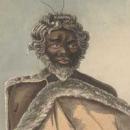 Windradyne - courtesy Wikimedia commonsSee full AustLit entry
Windradyne - courtesy Wikimedia commonsSee full AustLit entryAn Aboriginal leader of the Wiradjuri people. In the early nineteenth century he became the symbol of resistance against the European invasion of Wiradjuri lands in the area of New South Wales where Bathurst now stands.
Read the Australian Dictionary of Biography entry here and the Wikipedia article here.
Windradyne is the subject of a number of works in AustLit.
-
Windradyne’s Obituary
An obituary published in The Australian on 15 April 1829 gives a sense of the importance of Windradyne (or Windrodine, as he is referred to in the article), and also of the colonial attitudes of the time.
-
Windradyne on First Australians
The short film Windradyne—First Australians is about Windradyne and his central role in the conflict that would later be called the ‘Bathurst Wars’.
Duration: 05:42.
//www.youtube.com/embed/wm57Un8bsW0 -
Multiple Prize Winner
Swallow the Air has won numerous awards including the David Unaipon Prize in 2004.
See other winners and short-listed books at AustLit’s David Unaipon Prize page.
Other prizes Winch won for this work include:
– The Sydney Morning Herald Best Young Novelist of the Year (joint winner)
– The UTS Award for New Writing
– The Indigenous Writing Prize of the Victorian Premier’s Literary Awards
– The Nita May Dobbie Award
-
Rolex Mentorship
Winch was also the recipient of a Rolex Mentor and Protégé Award in 2008, which gave her the opportunity to work with Wole Soyinka, the Nigerian novelist and Nobel Prize for Literature winner.
View a video with Winch and Soyinka talking about the process of the mentorship.
-
See full AustLit entry
This review discusses Swallow the Air's narrative structure, characterisation and dialogue, and the prose style.
(...more)Moses, Alexa. 'Sparkling Journey Starts with a Punch.' Rev. of Swallow the Air by Tara June Winch. Sydney Morning Herald 20-21 May 2006: 35. Online at http://www.smh.com.au/news/book-reviews/swallow-the-air/2006/05/22/1148150151998.html. Sighted 06/12/2013.
-
See full AustLit entry
This profile of Tara June Winch discusses her Rolex Mentorship, her personal history, and Swallow the Air.
(...more)Cornwell, Jane. 'The Face: Tara June Winch.' The Australian. 14-15 June 2008. Sec: Review. 8. Online here. Sighted 06/12/2013.
-
– Authors and storytellers with Wiradjuri heritage
– Works with Redfern as a subject
– Works with Stolen Generations as a subject
You might be interested in...


